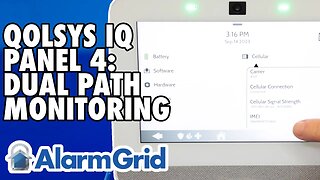Dual Path Monitoring
In this video, Joe talks about dual path monitoring and the benefits that it provides. The reason that many users choose a dual path monitoring setup is so that they can receive the ultra-fast speeds of an IP connection, along with the excellent reliability and consistency of cellular communication.
A dual path setup means that the system is able to communicate across both IP and cellular connectivity. Internet protocol (IP) refers to either a hardwired ethernet connection or a wireless WIFI connection. Cellular connectivity is done a across a cellular network that is operated by a cellular service provider, such as AT&T or Verizon. With a dual path communication setup, a system will generally use the IP connection as its primary communication path. But if the internet ever goes down, it will still be monitored using its cellular backup.
Having cellular backup for an alarm system can be extremely important. This is because an internet connection will often go down, sometimes seemingly for no reason. Additionally, internet service will become unavailable when the power goes down. However, cellular connectivity almost never goes down, and it will continue to work when the power goes out. Any system in a location where the power frequently goes out will definitely want to rely on cellular communication as a backup.
In order to use IP or cellular communication, an appropriate communicator is needed. These communicators will often need to be purchased separately. For a dual path setup, both an IP communicator and a cellular communicator. A panel may already have one installed, but it will still need to have the other type of communicator added on its own. Additionally, the user will need a higher-level monitoring plan that includes cellular monitoring. Keep this in mind when planning the communication setup for an alarm system.
-
 3:39
3:39
Alarm Grid Home Security DIY Videos
7 months agoQolsys IQ Panel 4: Using Dual Path Monitoring
3 -
 1:40
1:40
OP Freedom
2 years agoOntario Police monitoring Facebook groups
67761 -
 2:29
2:29
WEWS
2 years agoCDC monitoring COVID-19 trends through wastewater treatment facilities
13 -
 14:02
14:02
riby
2 years agoMonitoring an Orchard with ESP32's and a SCADA Program
783 -
 59:12
59:12
Sports Wars
4 hours agoHarrison Butker ATTACKED By Woke Mob, Scottie Scheffler ARRESTED, Bronny James TRASHED By Scouts
19.4K24 -
 LIVE
LIVE
Moroney
4 hours agoWeekend Warrior Ravin' & Trollin
1,417 watching -
 30:01
30:01
World Nomac
21 hours agoI Visited the Long Neck Tribe of Thailand 🇹🇭
45.8K32 -
 9:28
9:28
ThinkStory
1 day agoOUTER RANGE Season 2 Ending Explained!
37K11 -
 16:43
16:43
TudorDixon
1 day agoHow was Harrison Butker Wrong? | The Tudor Dixon Podcast
45.3K118 -
 2:39:22
2:39:22
Drunk3PO
23 hours agoStar Wars, Achromatic Chronicles Green, & More | Drunk3po Live
50K8